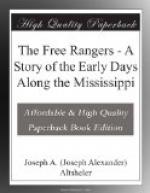“Looks as if it would be the right place,” replied Henry, “and it is certainly time to stop. The sun seems to go down faster here than it does In Kentucky.”
The twilight was spreading swiftly over the arch from west to east as they entered the cove and tied “The Galleon” to a live oak. Paul leaped joyfully ashore, glad to stretch his limbs again. The others quickly followed, and they set about gathering wood to build a fire. They were out of the Indian country now and they had no need to be cautious.
Paul bestirred himself looking for brushwood. Presently he found at the edge of the water a dead bough which was long enough to be broken into several sticks of convenient length. He picked it up, and for the purpose of breaking it brought it down heavily on a large brown log lying in the mud near the water.
To Paul’s amazement and horror, the big brown log got into action at either end. One end, in the shape of a tail, whipped around at him, barely missing him, and the other end, splitting itself horizontally in half, revealed huge jaws lined with terrible teeth. Paul sprang back with a cry, and Henry, who was near, rifle in hand, fired a ball into the monster’s brain. The big brown log, that was no log, turned partially over and died.
“An alligator,” said Henry, “I’ve heard of them, but this is the first that I’ve ever seen.”
“I’ve heard of them, too,” said Paul, “but I never thought I’d walk almost into the mouth of one without knowing it.”
Shif’less Sol had his grievance, too. “Now that’s another o’ the ways o’ this here southern country!” he exclaimed in a pained tone, “A big, hungry, wild animal, tryin’ to pass itself off ez, an old dead log. Up in Kentucky, a good honest bear, or even a sneakin’ panther, would be ashamed to look you in the face after tryin’ to play sech a low-down trick on a man.”
“It is certainly a hideous brute,” said Paul.
“I’m thinkin’ that we’d better build our fire big,” said Long Jim. “I don’t want to wake up in the mornin’ an’ find myself devoured by an alligator, jest when I wuz about to reach the great town uv New Or-lee-yuns.”
But they were not molested that night by either man or animal, and the next day, watchful and surcharged with interest, they approached New Orleans, which was bulking so large to them. The river looped out into a crescent and narrowed greatly. As they came to the city, the Mississippi did not seem to them to be more than a third of a mile wide, but they knew that it was extremely deep.
But there, snugly within the crescent, lay New Orleans, a town enclosed within palisaded fortifications that faced the levee for about a thousand yards, and that ran back perhaps half as far. The levee was lined with vessels. Already New Orleans was famous for shipping, and they saw the flags of many nations. Schooners there were and brigs and brigantines, and barks and barkentines, and other craft from Europe and the West Indies and South America. Near the shore was a great, high ship, from which the red and yellow flag of Spain fluttered in more than one place, while the muzzles of cannon protruded from her wooden sides.




